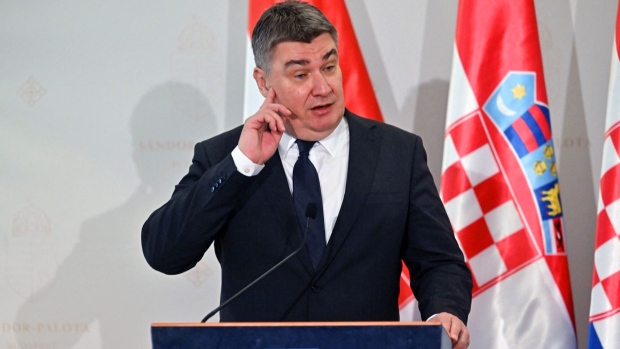Apr 16, 2024
Insult-Hurling President Poses Risk to EU in Croatia’s Election
, Bloomberg News

(Bloomberg) -- Croatian President Zoran Milanovic has opposed NATO expansion and condemned military aid to Ukraine as a “deeply immoral” path to prolonging the war with Russia. Now he wants to take the reins of government in Wednesday’s election.
The head of state plunged into the contest last month to thwart the ambitions of his arch-rival, Prime Minister Andrej Plenkovic, for a third term in office. Milanovic’s claims of corruption surrounding the administration and his penchant for lobbing insults at his political enemies has won him steady public backing.
The unexpected bid for the Adriatic state’s premiership threw open the contest and set off a constitutional standoff after the country’s top court ruled that the bid is “irreconcilable” with Milanovic’s duties as head of state – unless he resigns the post.
Should he gain a majority, the dynamic could shift Croatia, the European Union’s most recent member since accession in 2013, into the fold of nations including Hungary under Viktor Orban that’s defied the bloc’s consensus on Kyiv. Slovakia this month elected a president allied with the country’s Russia-friendly prime minister, Robert Fico, tightening the premier’s grip on power.
Milanovic, 57, a Social Democratic prime minister from 2011 to 2016, has attacked his opponents with increasingly vitriolic rhetoric. Plenkovic, 54, is a “protector of crime and corruption,” he’s said, and a “flaming badger.” After the Constitutional Court in Zagreb pushed back on his premiership bid, he hectored the justices as “prostitutes” and “illiterate mobsters.”
The invective has earned him a following. Elected president in 2020, he consistently tops the list of the country’s most popular politicians.
“Milanovic is popular because he cast himself as an attacker against the elite, which is a paradox for someone who was premier and is now president,” said Zarko Puhovski, political science professor at the University of Zagreb. “His inflammatory, often vulgar language resonates with people who are tired of wooden political statements.”
Russia’s Orbit
The move has stymied Plenkovic, a conservative who had bet on an easier path to victory after he steered Croatia into the euro area and the EU’s visa-free travel area. He’s warned that a Milanovic government would tear Croatia away from the EU mainstream and send it into Moscow’s orbit.
“Milanovic, with his irresponsible and unprincipled politics, is pushing Croatia and the Croatian people into a Russian world,” Plenkovic said at a rally of his Croatian Democratic Union, or HDZ, in the coastal city of Split on Friday.
Polls show that both leaders would fall well short of a majority, forcing them to cobble together a coalition. HDZ would win 60 seats in the 151-seat national assembly, or Sabor, while the Social Democrats would take 41, according to an Ipsos survey released by Nova TV late Sunday.
A right-wing nationalist party, Homeland Movement, is projected to win 15 seats. Mozemo, a left-wing grouping, would take 11, while Bridge, a centrist party, would get nine, the poll showed.
Croatia under Plenkovic has been a reliable partner for EU allies, but his tenure has been dogged by accusations of graft among HDZ officials. Seven ministers left the cabinet during the premier’s first term over a string of corruption cases, with several in various stages of investigation and indictment.
Those allegations have fueled Milanovic’s effort. The day that he himself set the April 17 election date last month, the president announced that “opportunity has knocked on my door” — and said he would run.
‘A Coup’
The volley prompted questions about its constitutionality, with the top court ruling that the sitting head of state — who nominates the prime minister — can’t campaign, run on a party list or present himself as a candidate. Milanovic responded defiantly, saying his ultimate goal remained to lead the government — and took aim at the court.
“This is a coup — they’re trying to obstruct the will of Croatian voters,” Milanovic told a crowd on March 18 in Vela Luka, a fishing village on the Adriatic coast. “I will be the prime minister, but I won’t tell those illiterate mobsters how I intend to do it.”
Milanovic, who has said he would resign the presidency only after the election — and wouldn’t formally nominate himself for the premiership, has largely been in campaign mode since.
“I know he sounds crazy, but at least he’s authentic,” said Davor Stipancevic, a 52-year-old retiree, as he said sipping coffee in central Zagreb. “I cannot bring myself to vote for the other side, they are too corrupted.”
©2024 Bloomberg L.P.







